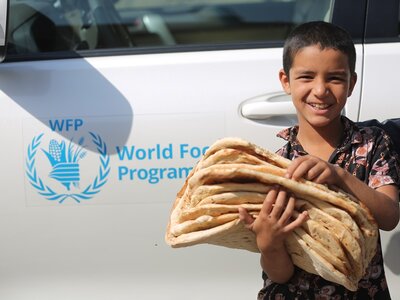Islamic Republic of Iran
- Over 3.4 million
- refugees and refugee-like individuals
- 35,000-plus
- refugees live in settlements
- 86 million
- population
Iran hosts one of the world’s largest and most protracted refugee populations, with Afghan and Iraqi refugees arriving in successive waves over the past four decades.
An estimated 3.4 million refugees and refugee-like individuals live across the country, including 35,000 of the most vulnerable who reside in 20 designated settlements across 13 provinces.
While the Government continues to promote voluntary repatriation as the preferred long-term solution, it faces a growing financial burden in supporting this population and has consistently called for increased international assistance.
These challenges have been exacerbated by rising inflation, limited employment opportunities and a soaring cost of living, leaving many refugees unable to meet their basic needs and increasingly at risk of food insecurity.
The World Food Programme (WFP) is deeply concerned about the recent military escalation in the Middle East. We are ready to rapidly scale up humanitarian assistance in Iran and neighbouring countries, to support vulnerable communities and ensure food security during these turbulent times.
On an ongoing basis, WFP provides life-saving food assistance, promotes girls’ education, supports income-generating activities, and enhances resilience through a hybrid model of cash transfers and food distributions.
WFP also maintains readiness to support national emergency response efforts.
We work with the Government and United Nations partners to ensure that the most vulnerable refugees continue to receive critical assistance, until conditions are conducive for their safe, voluntary and dignified return home.
What the World Food Programme is doing in Iran
-
Assistance to refugees
-
WFP helps meet the basic food and nutrition needs of 35,000 refugees across 20 settlements. Through a hybrid model of food and monthly cash transfers, refugees can access essential food items and make dietary choices based on their needs. Women-headed households receive full food entitlements, while men-headed households receive 80 percent. Additional cash top-ups are provided to people with disabilities. Food is sourced locally and distributed monthly to reduce logistics costs and support local markets.
-
School-based programmes
-
Resilience
-
Emergency response
-
Cash-based transfers for partners
Iran (Islamic Republic of) news releases
Go to pagePartners and donors
Find out more about the state of food security in Iran (Islamic Republic of)
Visit the food security analysis pageOperations in Iran (Islamic Republic of)
Contacts
Office
No. 7, Nezami st., Ghoba St., Shariati Ave., Tehran, Iran
Iran







